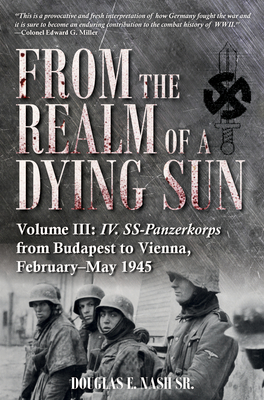From the Realm of a Dying Sun. Volume III: IV. Ss-Panzerkorps from Budapest to Vienna, February-May 1945

From the Realm of a Dying Sun. Volume III: IV. Ss-Panzerkorps from Budapest to Vienna, February-May 1945
The scholarship that went into these books is impeccable, with the author deftly weaving primary and secondary sources to form an excellent and thought provoking picture of this period in the Second World War.Globe at War
In the closing months of World War II, with Budapest's fall on 12 February 1945 and the breakout attempt by the IX SS-Gebirgskorps having failed, the only thing the IV. SS-Panzerkorps could do was fall back to a more defensible line and fortify the key city of Stuhlweissenburg. Exhausted after three relief attempts in January 1945 and outnumbered by the ever-increasing power of Marshal Tolbukhin's Third Ukrainian Front, SS-Obergruppenf�hrer Gille's veterans dug in for a lengthy period of defensive warfare. However, Adolf Hitler had not forgotten about the Hungarian theater of operations nor the country's rich oilfields and was sending help.
To the detriment of the defense of Berlin, SS-Oberstgruppenf�hrer Sepp Dietrich's legendary 6. Panzerarmee was on its way, not to retake Budapest, but to encircle and destroy Tolbukhin's forces and completely reverse the situation in south-eastern Europe in Hitler's favor. This overly ambitious offensive, known as Fr�hlingserwachen (Spring Awakening), was soon bogged down in the face of resolute Soviet defenses aided by the springtime thaw. Heralded as Nazi Germany's last great offensive of World War II, it resulted in great losses to Hitler's last armored reserve in exchange for only minor gains. Though it played a supporting role during the battle, the IV. SS-Panzerkorps was soon caught up in its aftermath, after the Red Army launched its Vienna Operation that nearly swept the armies of Heeresgruppe S�d from the battlefield.
Withdrawing into Austria, Gille's battered corps attempted to bar the route into Germany, while the Red Army bore down on Vienna. Forced to endure relentless Soviet attacks as well as the caustic leadership of the 6. Armee commander, General Hermann Balck, the men of the IV. SS-Panzerkorps fought their way through Austria to reach the safety of the demarcation line where it finally surrendered to U.S. forces on 9 May 1945 after nearly a year of relentless campaigning.
PRP: 216.00 Lei
Acesta este Prețul Recomandat de Producător. Prețul de vânzare al produsului este afișat mai jos.
194.40Lei
194.40Lei
216.00 LeiLivrare in 2-4 saptamani
Descrierea produsului
The scholarship that went into these books is impeccable, with the author deftly weaving primary and secondary sources to form an excellent and thought provoking picture of this period in the Second World War.Globe at War
In the closing months of World War II, with Budapest's fall on 12 February 1945 and the breakout attempt by the IX SS-Gebirgskorps having failed, the only thing the IV. SS-Panzerkorps could do was fall back to a more defensible line and fortify the key city of Stuhlweissenburg. Exhausted after three relief attempts in January 1945 and outnumbered by the ever-increasing power of Marshal Tolbukhin's Third Ukrainian Front, SS-Obergruppenf�hrer Gille's veterans dug in for a lengthy period of defensive warfare. However, Adolf Hitler had not forgotten about the Hungarian theater of operations nor the country's rich oilfields and was sending help.
To the detriment of the defense of Berlin, SS-Oberstgruppenf�hrer Sepp Dietrich's legendary 6. Panzerarmee was on its way, not to retake Budapest, but to encircle and destroy Tolbukhin's forces and completely reverse the situation in south-eastern Europe in Hitler's favor. This overly ambitious offensive, known as Fr�hlingserwachen (Spring Awakening), was soon bogged down in the face of resolute Soviet defenses aided by the springtime thaw. Heralded as Nazi Germany's last great offensive of World War II, it resulted in great losses to Hitler's last armored reserve in exchange for only minor gains. Though it played a supporting role during the battle, the IV. SS-Panzerkorps was soon caught up in its aftermath, after the Red Army launched its Vienna Operation that nearly swept the armies of Heeresgruppe S�d from the battlefield.
Withdrawing into Austria, Gille's battered corps attempted to bar the route into Germany, while the Red Army bore down on Vienna. Forced to endure relentless Soviet attacks as well as the caustic leadership of the 6. Armee commander, General Hermann Balck, the men of the IV. SS-Panzerkorps fought their way through Austria to reach the safety of the demarcation line where it finally surrendered to U.S. forces on 9 May 1945 after nearly a year of relentless campaigning.
Detaliile produsului










